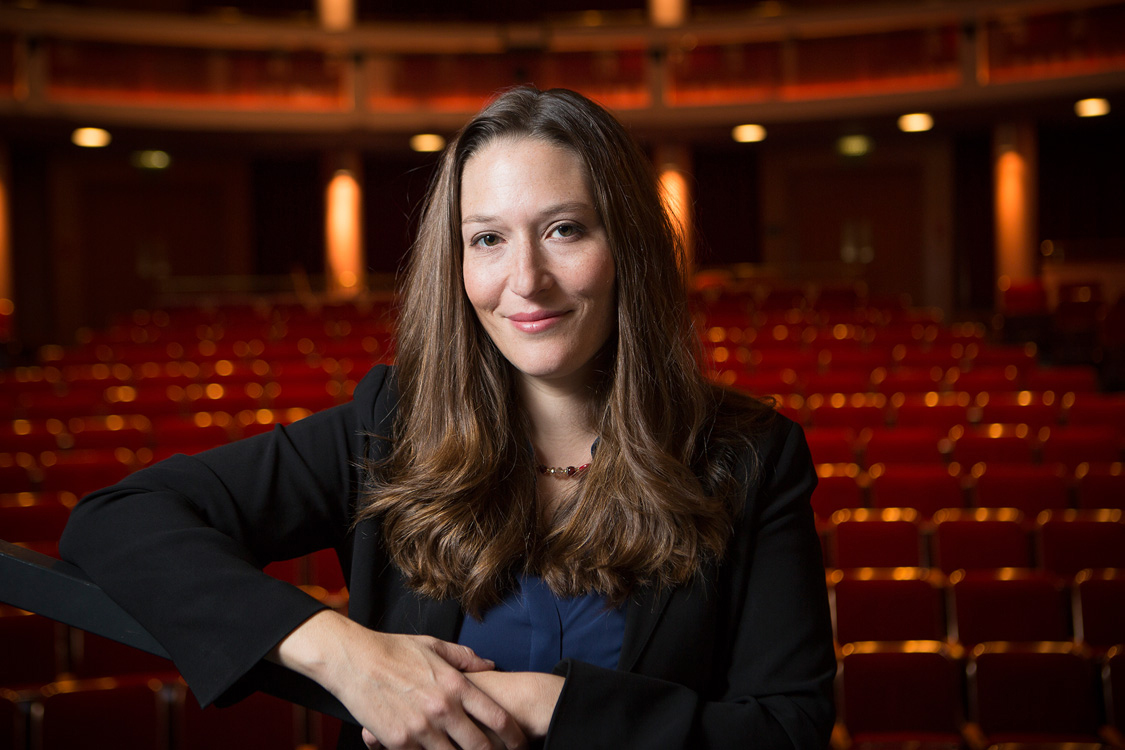New book offers grassroots view of Egypt's uprising
By Linda B. Glaser

Tahrir Square: ground zero for the Egyptian uprising and the toppling of Hosni Mubarak’s government. During the mass protests, images of violence filled the news, but behind the scenes, something else was developing – a vibrant scene of performance and theater.
“The occupation of Tahrir Square unleased a surge of creative energy,” says Rebekah Maggor, assistant professor of performing and media arts. “Artists entertained the crowds with poetry and improvisation. Theater was instrumental in this quintessentially democratic moment. It was a way for grassroots activists to mobilize people and challenge the official narratives propagated by the government-controlled media.”
After Mubarak’s ouster, artists returned to their rehearsal halls to create structured texts about their experiences of protest. Maggor has translated some of those texts in her new anthology, “Tahrir Tales: Plays from the Egyptian Revolution,” co-edited with linguist Mohammed Albakry.
The book’s 10 plays bring together work by established and emerging playwrights, from state theaters and experimental ensembles.
“Many of the plays arose directly from writers’ experiences in Tahrir Square, but the collection actually spans the twilight of Mubarak’s regime through the ascendancy of Egypt’s current president, Abdel Fattah el-Sisi.” Maggor says. “Collectively these plays explore a full arc of popular uprising from genesis and progression to aftermath.”
As a theater artist and scholar, Maggor’s focus is theater of protest; in particular, she is interested in contemporary drama in the Middle East. “I’m interested in theater that provides a lens onto the radically democratic political imagination of protest movements and offers unmediated and mostly uncensored perspectives of ordinary participants.”
Maggor pays special attention to the way women’s voices are heard through these plays and the roles they play beyond public protests. In the one-woman play “They Say Dancing is a Sin” a belly dancer delivers scathing criticism of Egypt’s elite. “She’s a modern-day Robin Hood who uses her wiles and artistic prowess to redistribute wealth from the plutocrats to the people,” Maggor says.
Last spring, Maggor directed a workshop of the play at the Huntington Theatre in Boston.
The audience learned a lot about women in Egypt but they also found ways to connect the dancer’s story to issues facing women in the U.S. “The play asks how poverty effects a woman’s status. Is it possible for a woman to find liberation without financial independence?” Maggor says. “I choose to translate plays that provoke American audiences to think about the challenges we face in our own society. Sometimes, it’s easier for us to reflect on these difficult questions when we’re not facing a mirror image, when there’s some form of distance.”
Maggor wrote an in-depth introduction to contextualize the plays historically and politically. “I wanted to put these plays within the context of the recent uprising in Egypt. These plays are a thread in a rich tapestry of performance events and also part of a rich history of anti-colonial and anti-elitist protest theater in Egypt.”
In addition to the time she’s spent in the Middle East, Maggor earned an MFA in acting from the Moscow Art Theater School in Russia. Her training as an actor has shaped her approach as a translator and director.
“As a director, I’m interested in the ways that the voice and body embodies protest,” she says. “As a dramatic translator, this visceral connection to the text has a huge influence on my creative process. I go to exceptional lengths to workshop my translations with skilled actors. There are certain things I can only discover in performance.”
Current projects for Maggor include an anthology of contemporary Palestinian drama in translation, research on the creative process and politics of the Khashabi Ensemble Theatre in Haifa, Israel, as well as directing her translation of “Desert of Light,” a new play by Palestinian-Syrian writer Rama Haydar, for the PEN America World Voices Festival.
A reading and panel discussion of Maggor’s anthology will be held Monday, March 6, at 4:45 p.m. in the Film Forum, Schwartz Center.
Linda B. Glaser is a writer for the College of Arts and Sciences.
Media Contact
Get Cornell news delivered right to your inbox.
Subscribe